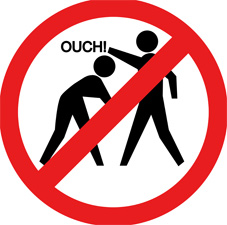
No Room for Rebuke
The love of parents for their children enables them to accept all the pranks and wrongdoings of their children. Love compensates for everything...

Translated by Rabbi Lazer Brody
The great Rabbi Isser Zalman Meltzer, of saintly and blessed memory, once tested the children of his famed “Eitz HaChaim” Yeshiva in Jerusalem. One of the students made a mistake, and Rav Isser Zalman wanted to give the student a way to save face, so he said, “Maybe you meant …?”
The child didn’t understand, and said, “No, Rebbe. I meant what I said.”
Rav Isser Zalman tried again to slip the child the right answer, and said, “Surely you meant to say …”
But again the child did not understand that the Rav was trying to correct his mistake gently without embarrassing him. The child continued to argue that he meant exactly what he said. This continued for a while, until the other children began to lose their patience.
The Rav then asked the child to wait a few minutes as he needed to go out. Rav Isser Zalman went out, and began pacing back and forth, repeating to himself emphatically, “Respecting creations also includes respecting little children! Respecting creations also includes respecting little children!”
Rav Isser Zalman was very careful not to damage the dignity of any person, even if it’s an obstinate child who does not comprehend that the Rav was trying to correct his mistake in an honorable way. He loved every one of his students, from young to old.
There is something about love that is magical, especially in educating our children. It begins with the love  between husband and wife; where there is love between parents, then of course there is love for children, and then there is no need to learn about child-raising. For love is G-dly, love is Hashem. In a house of love, children grow automatically in an upright manner.
between husband and wife; where there is love between parents, then of course there is love for children, and then there is no need to learn about child-raising. For love is G-dly, love is Hashem. In a house of love, children grow automatically in an upright manner.
My mother, may she rest in peace, never learned formally how to raise children; but, she was the epitome of love. There is no way to understand the love she gave us. She didn’t even learn how to read or write, but professors of education could have learned from her. She possessed such tremendous love and patience! And my father was a righteous person, with good character traits, with so much mercy and desire to give! This wholesome home atmosphere was imbibed by my siblings and I.
All the love and desire to give that I have for humanity comes from the fact that I was raised with so much love and patience. All of the intellectual aspects of education which save many children come to me naturally, without my studying education, because I learned with so much love and warmth. I then understood the proper way to educate.
People who receive goodness during their childhood reciprocate with goodness during their adulthood. It’s easy for them to give. The opposite is also painfully true. One who grows up with cruelty will ultimately treat others cruelly as an adult.
A person raised with criticism, screaming, and anger doesn’t usually have the emotional strength to deal with life, nor the ability to give. As an emotional cripple, he can’t give when he himself suffers from an emotional deficit. Since he didn’t receive, he has nothing to give. And even if he works on himself and gives, his giving is far from natural. An emotionally healthy person can give easily, for he has what to give.
A person who was raised with criticism cannot accept rebuke or criticism at all, because he is emotionally handicapped! His soul has been damaged from repeated, difficult, and painful injuries. The bitter outcome of this is that he cannot build a proper home, because he cannot accept any criticism or remark from his partner; in a relationship, it’s inevitable that a person will receive criticism from his partner. So, if he cannot accept this emotionally, then he cannot establish a home or a relationship. He will respond fiercely to the slightest comments or criticism and then a war breaks out. From there to separation is a short distance.
The essence of educating children is to raise them with love. Certainly every parent loves his children. But the love that parents have for children doesn’t necessarily give parents the understanding of how to raise their children in love. For we see that many children grow up sensing a lack of love from their parents, so we have to further define how love is expressed from parents to children.
Here’s another example from my mother’s home. We were raised without rebuke or nervous tension. Our loving parents were people of faith; anger had no part in their lives, so we were never the brunt of parental rage and venting. We were children in the full sense of the word, meaning we were mischievous and not angels in the least. We caused problems for our parents and did crazy things like all children. But our parents had patience for this; we felt that they loved us just as we were. So we grew up in an environment devoid of rebuke, criticism, and anger. We grew up with the love of life.
And so, even when we got older and caused much sorrow to our parents when we did not go to the synagogue or follow in their path, Mother, of blessed memory, was obstinate about accepting us with love, without reprimands and without complaint – she just accepted us. She used to say to Father, ob”m, “Whatever will be, these are our children!” As such, we never avoided or hid from our parents; we shared everything with them. Ultimately, their prayers, patience and love brought us back to the correct path.
King Solomon in Proverbs (Chapter 10) says, “Love compensates for all wrongdoing”. The love of parents for their children enables them to accept all the pranks and wrongdoings of their children. Love compensates for everything! It’s very easy to accept anything a child does when parents love the child. So if all parents really love their children, then why don’t they accept all the pranks with patience? Their love for their children is limited by their own poor character traits, which cause them to be cruel to their children, venting anger on them and meting out cruel punishments.
Rebbe Nachman says that it is forbidden to rebuke, because the way of rebuke is not education. Education is to give a child desire, motivation, to encourage and push the child in the right direction with motivation. The way of “How lucky are we”, meaning, encouragement and positive reinforcement. A parent must show a child how to rejoice in all the blessings Hashem gives us, saying, “How lucky are you that you are privileged to learn!” And, when a child is obedient, parents should encourage more of the good behavior by saying, “How praiseworthy is the child who listens to his parents!” This is the appropriate way to bring about the desired results. Praise and prizes are much more effective than punishments. Sometimes, however, we need to utilize punishment in order to establish boundaries, but that needs to be sparing, only in extreme or dangerous circumstances.
Certainly all parents love their children, but they must learn how to express that love, so that children don’t interpret their actions as a lack of love. Basically, rebukes and reprimands, and certainly cursing, embarrassing, yelling, screaming, and beating will be interpreted as lack of love. Practically, sometimes a parent must turn a blind eye; rather than rebuking the child, the parent should pray for the child, serve as a personal example and always be encouraging.





